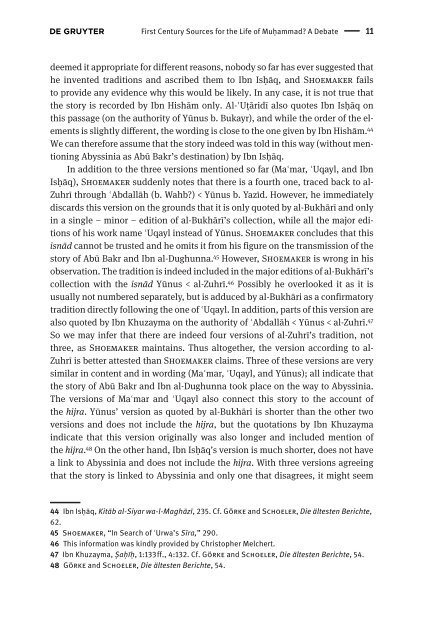0021-1818_islam_98-1-2-i-259
0021-1818_islam_98-1-2-i-259
0021-1818_islam_98-1-2-i-259
Create successful ePaper yourself
Turn your PDF publications into a flip-book with our unique Google optimized e-Paper software.
First Century Sources for the Life of Mu1ammad? A Debate 11<br />
deemed it appropriate for different reasons, nobody so far has ever suggested that<br />
he invented traditions and ascribed them to Ibn Is1aq, and Shoemaker fails<br />
to provide any evidence why this would be likely. In any case, it is not true that<br />
the story is recorded by Ibn Hisham only. Al-^Utarid\ also quotes Ibn Is1aq on<br />
this passage (on the authority of Yunus b. Bukayr), and while the order of the elements<br />
is slightly different, the wording is close to the one given by Ibn Hisham. 44<br />
We can therefore assume that the story indeed was told in this way (without mentioning<br />
Abyssinia as Abu Bakr’s destination) by Ibn Is1aq.<br />
In addition to the three versions mentioned so far (Ma^mar, ^Uqayl, and Ibn<br />
Is1aq), Shoemaker suddenly notes that there is a fourth one, traced back to al-<br />
Zuhr\ through ^Abdallah (b. Wahb?) < Yunus b. Yaz\d. However, he immediately<br />
discards this version on the grounds that it is only quoted by al-Bukhar\ and only<br />
in a single – minor – edition of al-Bukhar\’s collection, while all the major editions<br />
of his work name ^Uqayl instead of Yunus. Shoemaker concludes that this<br />
isnad cannot be trusted and he omits it from his figure on the transmission of the<br />
story of Abu Bakr and Ibn al-Dughunna. 45 However, Shoemaker is wrong in his<br />
observation. The tradition is indeed included in the major editions of al-Bukhar\’s<br />
collection with the isnad Yunus < al-Zuhr\. 46 Possibly he overlooked it as it is<br />
usually not numbered separately, but is adduced by al-Bukhari as a confirmatory<br />
tradition directly following the one of ^Uqayl. In addition, parts of this version are<br />
also quoted by Ibn Khuzayma on the authority of ^Abdallah < Yunus < al-Zuhr\. 47<br />
So we may infer that there are indeed four versions of al-Zuhr\’s tradition, not<br />
three, as Shoemaker maintains. Thus altogether, the version according to al-<br />
Zuhr\ is better attested than Shoemaker claims. Three of these versions are very<br />
similar in content and in wording (Ma^mar, ^Uqayl, and Yunus); all indicate that<br />
the story of Abu Bakr and Ibn al-Dughunna took place on the way to Abyssinia.<br />
The versions of Ma^mar and ^Uqayl also connect this story to the account of<br />
the hijra. Yunus’ version as quoted by al-Bukhari is shorter than the other two<br />
versions and does not include the hijra, but the quotations by Ibn Khuzayma<br />
indicate that this version originally was also longer and included mention of<br />
the hijra. 48 On the other hand, Ibn Is1aq’s version is much shorter, does not have<br />
a link to Abyssinia and does not include the hijra. With three versions agreeing<br />
that the story is linked to Abyssinia and only one that disagrees, it might seem<br />
44 Ibn Is1aq, Kitab al-Siyar wa-l-Maghazi, 235. Cf. Görke and Schoeler, Die ältesten Berichte,<br />
62.<br />
45 Shoemaker, “In Search of ^Urwa’s Sira,” 290.<br />
46 This information was kindly provided by Christopher Melchert.<br />
47 Ibn Khuzayma, Sahih, 1:133ff., 4:132. Cf. Görke and Schoeler, Die ältesten Berichte, 54.<br />
48 Görke and Schoeler, Die ältesten Berichte, 54.


